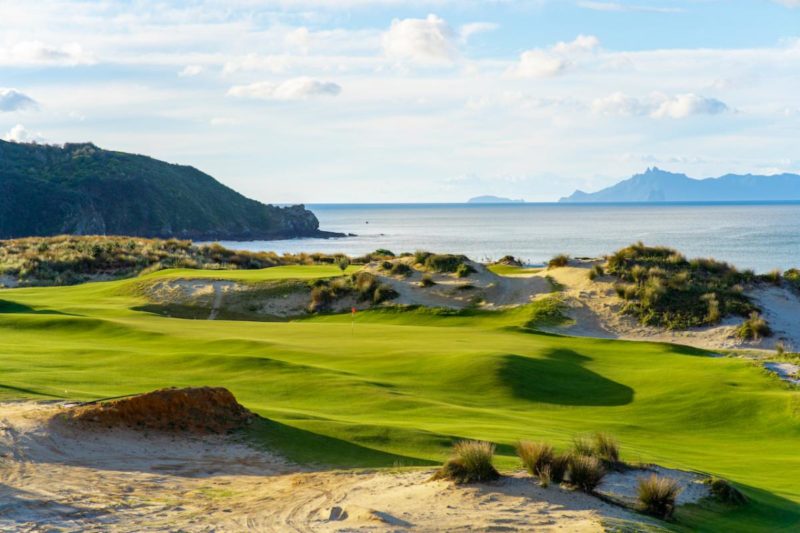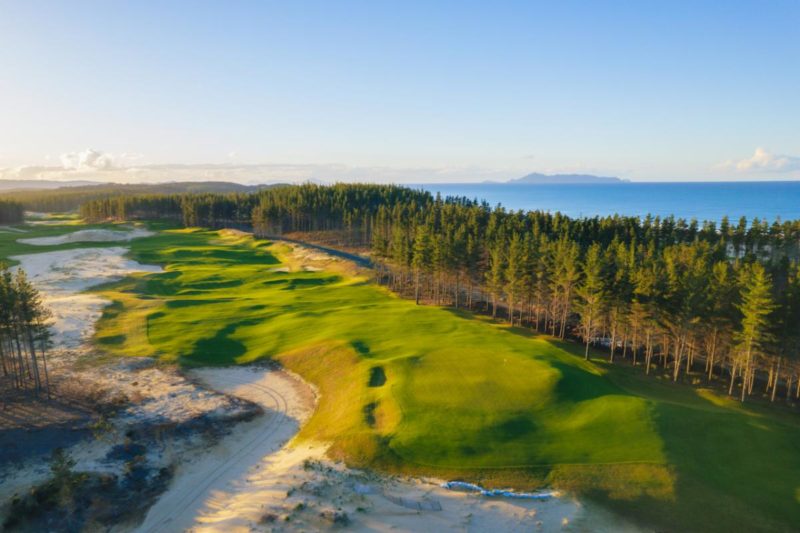TE ARAI, New Zealand — Tom Doak’s latest Kiwi masterpiece, executed amid high dunes 90 minutes north of Auckland, officially opened for play on Oct. 1.
While the hotly anticipated North Course at Te Arai Links will bring this acclaimed resort to 36 holes, the remaining amenities — Members-only Bunker Bar, Ocean Restaurant, North Clubhouse and remaining luxury accommodations — are all on schedule to be completed by October 2024.
Doak and the team at Renaissance Golf Design have fashioned the North Course in the shadow of their own work: the ultra-private Tara Iti Golf Club just up the beach, a layout routinely ranked among the top courses on Earth.
Just down the beach, the Bill Coore & Ben Crenshaw-designed South Course at Te Arai Links has been dazzling golfers since it opened Oct. 1, 2022. Last spring, that track ranked No. 7 among all courses in Asia-Pacific and No. 2 in New Zealand, behind Tara Iti.

As perhaps the most sought-after course architect in the golfing world, Doak remains unbowed by these glittering stablemates and the high expectations they create.
“It feels a bit weird to apologize for having seven holes on the ocean, especially when the rest of our North Course plays through terrain where the best comp might be Pine Valley,” Doak says. “At Tara Iti, you’re looking at the Pacific Ocean from every hole. On Bill’s course, all but the first few holes play directly at seaside. That’s just the reality down here, yet everyone is pleased with the way the North Course stands on its own, beside each of these world-class golf courses.
“We honestly didn’t feel we were competing with Tara Iti or the South Course. But we did want the North Course to be different — and fun. We’re quite certain that we succeeded on both counts.”
The South Course at Te Arai Links, the South Clubhouse, Ric’s Pizza Barn and The Playground — the resort’s massive putting course and beating communal heart — have all been operational for a year now. The same is true for Te Arai’s collection of luxury two-bedroom cottages and suites, all of them deftly camouflaged by the surrounding dunescape.
The debut of the North Course, however, does underline the concerted, ongoing development progress at Te Arai Links, located some 90 minutes north of New Zealand’s primary international airport. A dedicated clubhouse serving the North Course will open in October 2024. The Ocean Restaurant — overlooking the 18th hole on the South Course — will be christened simultaneously. Fully accoutered halfway houses on both courses are scheduled to come online before the 2023 season is complete, according to Te Arai Links Managing Partner Jim Rohrstaff, while the Members-only Bunker Bar will open early in 2024.
Te Arai Links does offer membership. Members and resort guests will toggle between the two 18-hole layouts depending on the day of the week. Only a resort club with 36 holes of commensurate, world-class quality could manage this sort of arrangement.
Coore & Crenshaw, and now Doak, have seen to that. All told, Te Arai Links is rapidly evolving into a dreamy links destination with few peers in either hemisphere.
“The physical, linksland attributes of this property obviously enable what we’re creating here,” said Rohrstaff, who also owns Auckland-based real estate brokerage, Legacy Partners, and directs property matters at Te Arai Links and Tara Iti. “Other natural factors also play to our strengths: Winter in the Northern Hemisphere is high summer down here, meaning longer, warmer days you just won’t find wintering in places like Palm Springs or Florida, for example.
“Folks may not realize that this portion of New Zealand’s North Island is sub-tropical, so even the ‘winter months’ of June, July and August feel pretty darned summery to anyone visiting from North America, East Asia or Europe. And with the potential change in government, the idea of foreigners buying a slice of this paradise, here in New Zealand, could well become a reality.
“It’s honestly a dream come true, for our entire team to have all 36 holes in play. Tom Doak and Bill Coore and Ben Crenshaw have each done such incredible jobs designing these two golf courses. Their work has exceeded our expectations. Yet we’re equally proud of the casual, inclusive vibe that prevails here. We wanted Te Arai Links to feel different — to welcome and engage traveling golfers but also non-golfers, spouses and kids. It really does, and that’s rare.”
Doak’s 6,931-yard, par-71 North Course opens and closes at seaside, with another sweep down to the Pacific Ocean at holes 8 and 9. Elsewhere, the unique routing explores what had been a pine forest set on dunes high above the beach. Doak spent months on site — personally shaping green complexes and fairway features behind the controls of a bulldozer.
Typically, the award-winning architect jets into a project, inspects and suggests for several days, then leaves the earthmoving to his long-time associates in the Renaissance shaping and construction crews. However, because the North Course took shape during the COVID-19 pandemic, Doak traveled to New Zealand in the spring of 2022, and stayed for two full months. The upshot of this arrangement, as fans of his work might suspect, is out of this world.
“I’m still not that great on the dozer, but I do love it,” Doak says. “Some of the results are pretty wild, like the greens at seven and four. Maybe too severe at first glance. But in the end, they looked really cool and we all agreed: Let’s keep that.
“To be honest, for this course to be spoken of equally, alongside the South Course, we felt we had to do more with the golf. This is legitimately great inland terrain — pure sand and dunesy, with big undulations. But we couldn’t rely on that. We agreed that if we’re going to produce something different, we should probably be a bit edgier. The overall shaping, greens and fairways, speak to that, I think.”
The routing includes several world-class seaside holes — including the epic, par-3 17th, and a par-5 closer that tracks the shoreline all the way home. Throughout the routing, Doak and his fellow shapers Angela Moser, Clyde Johnson and lead associate Brian Slawnik (who also shaped Tara Iti) each managed to create exquisite, dramatic, flamboyant features.
When discussing the North Course, however, the inland holes are what Doak talks about first — especially those that occupy a massive valley in the middle of the routing.
“Before we moved any dirt, we all identified that natural bowl and I think we used it very well. I really like how the holes in there, 4 through 7, came out. All of them. Eight plays down to the water from the edge of that bowl, and I love the way 9 comes back uphill intothe bowl. Really cool, with a blind approach — over a road! The last 150 yards of that par 5 are just awesome.”
Doak’s routing also produced a traditional, linksland staple: half-par holes: “At one point, we had the potential of five or six par 5s out there. The course will play to a par of 71, but the routing does affect difficulty. There are some very strong par 4s on this golf course. Good short ones, too — but some real beasts. The reality is, everything on the North Course remains very close to the ocean. On any given day, each of the 18 holes can play completely differently depending on wind direction. That’s what golf by the sea is all about.”
Golfers locally and from around the world are understandably eager to experience some of Doak’s finest work to date. Which begs the inevitable question of Te Arai Links patrons: “What’s your preference, North or South?” The spirited debate is now joined, over a drink at Ric’s restaurant or a 10-footer on The Playground, the world’s largest putting green.
On this important, potentially divisive matter, Rohrstaff offered up some sage, in-house counsel: “Play them both. Then decide for yourself.”


